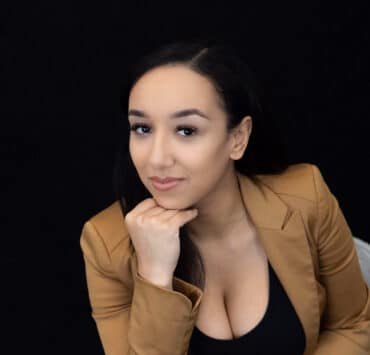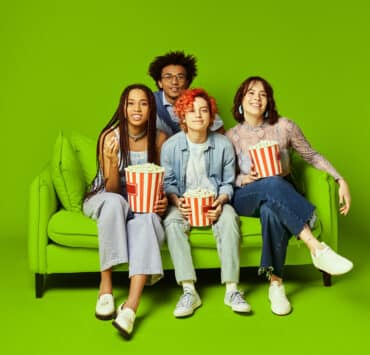|
Getting your Trinity Audio player ready...
|
A passion for equality in music drives everything that Diana Dotel does.
“Everywhere I looked, I was told things weren’t possible and us as Latinos couldn’t be this or that,” says Dotel, who grew up in New York City as a first-generation Dominican. “I grew up on hip-hop and pop music but didn’t know one person at a non-Latin label or company despite being a 200 percenter and knowing both English and Spanish. I know how resilient we are and deserve equal opportunity, and it’s been my core mission since realizing inequalities.”
After spending a decade producing and promoting concerts and live experiences, Dotel cofounded MTW (More Than Words) agency with Matt Ferrigno. MTW, an LA-based entertainment marketing agency, propels brands and artists through creativity and collaboration. The agency has worked with Latin artists like Bad Bunny, Camila Cabello, Becky G, and Doja Cat, and its most notable brand clients include Patrón, HBO, Amazon, Adidas, and Bacardí.
Dotel’s creativity and hands-on approach has brought her recognition within the industry. She has been honored on Ad Age’s Leading Women list as well as Billboard’s Women in Music and Latin Power Players lists. Dotel earned two Webby Award honors as a creator and executive producer on Becky G’s En La Sala podcast, which was exclusively licensed to Amazon as its first-ever Latin podcast.
“We have the ability to ‘see around the corner’ with a cultural IQ that pushes us in the right directions, as well as having the knowledge to work with the right talent and brands.”
Diana Dotel
But this doesn’t define her or how her team views her, she says. “I have an 80 percent Latina team that knows the work and my mission,” she says. “They joined the company seeing how we moved the needle in culture. That drives them and I can’t wait for them to have their own recognition.”
Dotel spoke with Hispanic Executive about how MTW is pushing the envelope on what an entertainment marketing agency can do and how the music industry should ensure more equal opportunities for Latin artists.
What strategies does MTW employ to create cultural moments for brands and artists?
One of our strongest strategies, and why many brands come to us, is our ability to identify cultural trends before others and putting them into action to benefit the brand. We’ve done this by identifying the crossover/mainstream appeal of Latin music and placing Maluma in a Michelob Ultra Super Bowl commercial—making him the first Spanish speaking artist to be featured in a Super Bowl ad. We even identify product trends in culture, like working with Nicki Minaj to create her own brand of press-on nails (Pink Friday Nails). We like to call it our ability to “see around the corner.” This is born out of myself and the team’s love of all things music and culture.
What inspired you to create Mujeres Del Movimiento? What were some of the challenges you faced when organizing a festival with an all-women lineup?
The inspiration behind Mujeres Del Movimiento is ironically the challenge as well. In my many years of being a concert promoter, I saw the inequality with Latin female artists and how they would seldom tour—it was always Ozuna, Nicky Jam, Bad Bunny, etc., and never female artists in Urbano. Seeing this year after year gave me the drive and passion to create a platform and brand that would help level the playing field.
It’s still a challenge today if you look at Latin festivals. They typically range from 8–20 percent female on the artist lineup. That’s because, historically, the Latin community hasn’t paid for concert tickets to see female artists, yet 70–80 percent of ticket purchasers in Latin music are women. There was an untrue sentiment among the live Latin touring industry that said “La Mujeres No Vende,” but it was because they had just never tried. It wasn’t until AEG promoting Karol G’s first headline tour in 2021 that opened up the floodgates.
With Mujeres, there were a lot of challenges. I have been trying to produce a festival show since 2018. And I have faced various challenges from COVID to doubt from managers, agents, or top promoting companies. Additionally, I didn’t have the financial backing or copromoter, so I was personally taking on 100 percent of the financial risk for the show.
Last year’s challenge was that people would say the show was canceled due to poor ticket sales, despite that not being true. I had never seen that, but it was the result of doing something groundbreaking and the overall doubt it created. We proved everyone wrong, and I think the industry is evolving and wants to see and support more women. The industry just started welcoming women into the live space. It also takes us women to support these female artists and show out in record breaking numbers to create that change.
Although change is happening, it’s still not equitable and that’s my mission.
“I can’t tell you how many times I get asked, ‘How do we tap into the Latin market?’ but the person really doesn’t understand it or its power.”
Diana Dotel
How does MTW Live push the envelope on what an entertainment marketing agency can do?
We have the ability to “see around the corner” with a cultural IQ that pushes us in the right directions, as well as having the knowledge to work with the right talent and brands.
Additionally, having a strong background in music allows me to create brand marketing campaigns that understand the talent in a unique way. How we do this is also nontraditional. It’s not about showing up on social media and doing a standard shoot. We’ve created custom live events, developed brands, and created products. We understand the nuances of different cultures. We utilize strong data and cultural IQ to create meaningful partnerships that people can identify with, which gives our clients the best results.
Tell me about the partnership with Camila Cabello and Bacardí. How did it come about?
The partnership with Camila came about with Bacardí being our client, and we were working with them on their new global brand campaign. This process started over a year ago, and we wanted someone who fit the DNA of the brand, and who better than Camila being from Havana, Cuba—which is also the birthplace of Bacardí. She was coming out with the new music for the first time in years, and it aligned with the timing of Bacardí’s campaign. It’s incredible when the artist and brand have multiple layers of synergies and there’s a mutual respect and creative vision to do something special. This partnership also marked the biggest global talent deal to date for Bacardí, which is so exciting.
What do you look for when you’re brokering brand deals for artists? How has the role of brand partnerships evolved in the music industry, especially for Latin artists?
I look for someone that has an authentic connection with the brand partner and is going to embrace the project. I ask a lot of questions on what their interests are and keep it top of mind for the right opportunity.
The business has evolved tremendously in general, and as in the past, artists didn’t look at brands. They looked at label deals, publishing, and touring as main revenue streams. When I started the agency, I had numerous artists that didn’t understand partnerships and assumed it was free money. It has evolved in Latin, but there is more growth ahead for the talent and brands—both sides are learning, and we’re truly just beginning. Latin doesn’t have its Ciroc, Beats, SKIMS, etc., and that’s where the evolution goes.
What steps do you think the industry needs to take to ensure more equal opportunities for Latin artists?
Understand it more. I can’t tell you how many times I get asked, “How do we tap into the Latin market?” but the person really doesn’t understand it or its power. The data is out, and they want our money, so I think education is missing. We are not a one-size-fit-all approach. Learn our nuances and dialects.
What advice would you give to young women aspiring to enter the entertainment marketing industry?
You can and you will! We need your strength, resilience, and knowledge. Find a mentor that has experience in the field or a position you’re looking to pursue, but also don’t only network up. Network around you—the assistant or intern next to you will one day be a VP, artist manager, or someone that you can create success with, as long as you’re patient and nurture those relationships.

